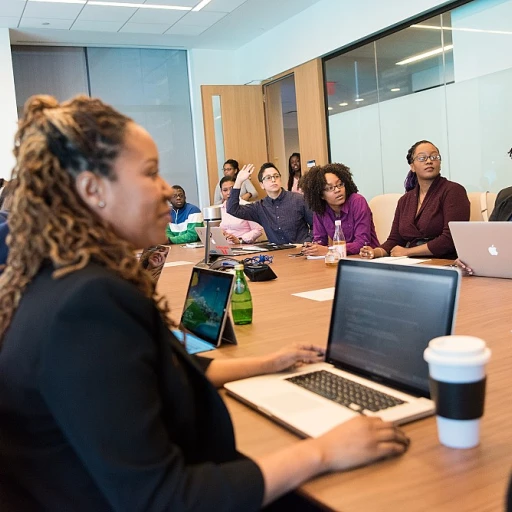
Understanding the Core of Leadership Development
Unveiling the Essence of Leadership Growth
At the heart of leadership development lies a profound understanding of what makes an effective leader. In the context of Rivera and Associates Inc's World Crowns Seminar, this exploration begins with a deep dive into the core principles that define leadership excellence. Leaders today face a myriad of challenges, from navigating complex organizational dynamics to fostering innovation and creativity within their teams. Understanding these foundational elements is crucial for anyone aspiring to grow in their leadership journey.
Leadership development is not just about acquiring new skills; it's about transforming one's mindset to adapt to the ever-evolving demands of the global landscape. Whether you're a senior manager at a corporation or an associate director at a medical center, the principles of effective leadership remain constant. They are about inspiring and guiding teams towards achieving common goals, while also nurturing individual growth and potential.
Organizations like services LLC and consulting groups across the globe are increasingly recognizing the importance of cultivating leaders who can drive change and innovation. This is particularly relevant in fields such as health care, where leaders at hospitals and medical centers must navigate the complexities of public health challenges and the demands of modern medicine.
Moreover, leadership development is not confined to the corporate world. Universities and educational institutions, such as state universities and schools of medicine, play a pivotal role in shaping future leaders. These institutions provide a foundation for emerging leaders to develop the skills necessary to tackle the unique challenges they will face in their careers.
For those interested in delving deeper into leadership growth, exploring resources that empower tomorrow's leaders can be invaluable. Empowering tomorrow's leaders is not just a goal but a necessity in today's fast-paced world.
Navigating Unique Leadership Challenges
The Ever-Evolving Landscape of Leadership Challenges
Navigating the world of leadership is no small feat, especially when faced with a myriad of challenges that require innovative and adaptive solutions. Today's leaders must be prepared to address a spectrum of issues that span across various domains such as health care, international business, and technological advancement. Leaders in the medical sector, for instance, must grapple with advances in medicine and changing public health policies. Health care services, whether operating under an LLC framework or expansive international management, demand acute foresight and agility. From senior managers at medical centers to program managers at state universities, the ability to adapt and lead amidst constant change defines successful leadership. Incorporating data-driven insights is becoming increasingly crucial. Corporations and consulting firms alike are now leveraging global data to anticipate market trends and patient needs, offering more personalized and effective solutions. Leaders must be adept at interpreting this data, transforming it into strategic decisions that benefit both patients and the organization. The corporate sector presents its own unique challenges, where financial health and regulatory compliance hold significant sway. Companies like financial groups and solutions LLCs in regions such as the Bay Area and Southern California must innovate to stay competitive while maintaining operational excellence under stringent regulations. For leaders in the public health arena, such as those managing hospitals from Los Angeles to Orange County, challenges often intersect with community needs and public policy. Here, leaders must balance resource constraints with the imperative to deliver comprehensive care, navigating complexities in health management and services. Navigating these diverse challenges calls for a comprehensive approach to leadership development. By engaging in leadership growth initiatives, leaders can hone their skills and strategies, effectively tackling both anticipated and unforeseen challenges. For an in-depth look at how these challenges are addressed, explore leadership growth initiatives.Building Emotional Intelligence in Leadership
Emotional Acumen as a Leadership Cornerstone
One of the pivotal aspects of developing strong leaders is enhancing emotional intelligence. Companies like Rivera and Associates Inc. emphasize the importance of leaders who can navigate their teams through complex emotional landscapes. This not only involves understanding and managing one's emotions but also recognizing and influencing the emotions of others.
In the ever-evolving field of management, incorporating emotional intelligence is crucial for maintaining healthy and productive working environments. Whether in the high-pressure settings of a cancer center or while managing large data teams in global corporations, leaders with high emotional intelligence tend to foster more innovative and collaborative outcomes.
Organizations, from international associations to local children hospitals in Los Angeles and Orange County, are increasingly recognizing the power of emotional intelligence. For senior managers and program managers, it aids in creating cohesive and motivated teams that thrive in challenging scenarios.
Rivera's seminar delves into techniques for enhancing this skill set. Specifically designed workshops and breakout sessions provide leaders with tools to better engage their teams and inspire them to achieve shared goals, especially in sectors related to health care and financial services.
In summary, building emotional intelligence is not just about personal growth for leaders; it creates a ripple effect that enhances team dynamics and drives the entire organization toward greater success.
Fostering Innovation and Creativity
Encouraging a Culture of Innovation
In the rapidly evolving landscape of leadership, fostering innovation and creativity is paramount. At Rivera and Associates Inc's World Crowns Seminar, this topic was explored in depth, emphasizing the importance of cultivating an environment where new ideas can flourish. Organizations, whether they are a global corporation or a local health care center, thrive when leaders encourage creative thinking among their teams.
Innovation in leadership is not just about groundbreaking inventions; it involves finding new solutions to existing challenges. For instance, medical centers and hospitals are continually seeking innovative ways to improve patient care and streamline operations. Leaders in these settings must balance creativity with practical management skills, often drawing on data-driven insights to guide their decisions.
Leveraging Diverse Perspectives
One of the key takeaways from the seminar was the value of diverse perspectives in driving innovation. Leaders who actively seek input from a variety of sources, including team members from different departments or cultural backgrounds, are more likely to uncover unique solutions. This is particularly relevant in international companies or services LLC that operate across borders, where understanding diverse markets can be a significant advantage.
Incorporating diverse viewpoints can also be beneficial in fields such as public health and medicine, where the needs of the community are constantly changing. By fostering a culture that values every voice, leaders can inspire their teams to think creatively and collaboratively.
Implementing Creative Solutions
To turn creative ideas into actionable strategies, leaders must also be adept at project management. This involves setting clear goals, allocating resources effectively, and maintaining open lines of communication. Whether leading a financial group in the Bay Area or a children's hospital in Los Angeles, the ability to implement innovative solutions is a critical component of effective leadership.
Ultimately, the seminar highlighted that the journey of leadership development is continuous. By embracing innovation and creativity, leaders can not only enhance their own capabilities but also drive their organizations toward greater success.
The Role of Communication in Leadership
The Impact of Effective Communication
Strong leadership hinges on effective communication, a cornerstone in establishing trust and achieving collective goals. For Rivera and Associates Inc., a significant focus at their World Crowns Seminar is to highlight how essential communication is for leadership roles. Whether within a health care setting or across corporate environments like a financial group, clear communication practices foster a sense of unity and purpose.
Leaders at any organization, be it a global corporation or a localized medical center, can benefit from honing their communication skills. Effective communication in leadership involves more than just conveying messages. It's about engaging with team members, understanding their perspectives, and responding to their needs. This leads to the creation of an open and collaborative environment where ideas can flourish.
Moreover, the ability to adapt communication styles to suit different stakeholders enhances a leader's capability to manage diverse teams. For instance, a program manager at a public health initiative or an associate director at a cancer center must communicate with colleagues, authorities, and patients from various backgrounds. Tailoring messaging appropriately, whether addressing children at a hospital or senior staff at a consulting group, is crucial.
Additionally, given the international reach of businesses today, language and cultural sensitivities play a pivotal role in communication. Organizations like services llc and solutions llc emphasize the importance of global communication strategies to ensure clarity, inclusivity, and respect across borders.
Finally, implementing regular feedback mechanisms within teams not only improves internal communication but also aids in leadership growth. Engaged leaders practicing active listening are better equipped to inspire innovation and foster a proactive work culture.













